|
|
|
Sort Order |
|
|
|
Items / Page
|
|
|
|
|
|
|
| Srl | Item |
| 1 |
ID:
159758
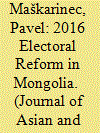

|
|
|
|
|
| Summary/Abstract |
This article tests the effects of a new electoral system that was introduced in Mongolia for the June 2016 elections. The decision to implement a first-past-the-post (FPTP) system instead of a mixed-member majoritarian (MMM) system, which was first and last used in the previous elections of 2012, was due to the April 2016 ruling of the Mongolian Constitutional Court on unconstitutionality of the list tier as one of the mechanisms for distributing seats within MMM. Through an analysis of national- and district-level results, this article addresses the question whether electoral competition at the district level was consistent with Duverger’s law and resulted in the restoration of bipartism, which had been disrupted in 2012 due to the use of MMM.
|
|
|
|
|
|
|
|
|
|
|
|
|
|
|
|
| 2 |
ID:
077223


|
|
|
|
|
| Publication |
2007.
|
| Summary/Abstract |
Emerging forms of empowered participatory governance have generated considerable scholarly excitement, but critics continue to ask if such initiatives are "for real": Are participatory governance processes sufficiently independent? Do citizen participants make good policy choices? An in-depth look at the case of the British Columbia Citizens' Assembly on Electoral Reform suggests that real citizen empowerment depends on both the institutional constraints of the participa-tory setting and how citizen interests and arguments for policy outcomes crystallize over the course of a participatory process
|
|
|
|
|
|
|
|
|
|
|
|
|
|
|
|
| 3 |
ID:
117077
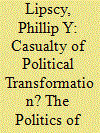

|
|
|
|
|
| Publication |
2012.
|
| Summary/Abstract |
The Democratic Party of Japan (DPJ) came to power in 2009 promising significant transportation sector reform, but it has struggled to implement its proposals. I argue that the DPJ's initiatives faltered due to the legacy of "efficiency clientelism." Historically, Japanese transportation policy combined two imperatives: (1) encourage efficiency by raising the cost of energy-inefficient transportation, and (2) redistribute benefits to supporters of the incumbent Liberal Democratic Party (LDP). Because of the legacy of efficiency clientelism, DPJ campaign pledges-designed to appeal broadly to the general public by reducing transportation costs- ran up against the prospect of sharp declines in revenues and energy efficiency. Efficiency clientelism was well suited to political realities in Japan prior to the 1990s, but recent developments have undercut its viability. This raises profound questions about the sustainability of Japan's energy efficiency achievements.
|
|
|
|
|
|
|
|
|
|
|
|
|
|
|
|
| 4 |
ID:
178108
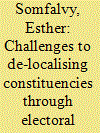

|
|
|
|
|
| Summary/Abstract |
Kazakhstan and Kyrgyzstan introduced a single-district closed-list proportional electoral system in 2007. Despite similar rules, the relationship between MPs and their constituencies differs: while the reform fostered nationwide representation in Kazakhstan, Kyrgyzstan’s MPs maintained a local, personalised representation style. This article explores how similar electoral rules lead to divergent outcomes under diverse party systems. Based on legal documents and 25 original interviews, the article provides two in-depth accounts of how electoral rules interacted with institutional counterincentives to guide the representative behaviour of MPs. The analysis covers the effects on MPs’ re-election strategies and the organisation of constituency service within factions.
|
|
|
|
|
|
|
|
|
|
|
|
|
|
|
|
| 5 |
ID:
092513
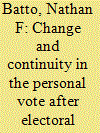

|
|
|
| 6 |
ID:
108142


|
|
|
|
|
| Publication |
2011.
|
| Summary/Abstract |
A growing scandal over phone-hacking, alleged bribery of senior police officers and the use of convicted private investigators to obtain private information illegally enveloped Rupert Murdoch's global media empire, News Corporation. Murdoch and his son James were questioned by MPs as pressure grew in Britain, and abroad, to curb the tycoon's dominant role. Malta voted to legalise divorce. A corruption inquiry called for action against South Africa's police chief, an ally of President Jacob Zuma. Nearly 1,400 protesters were arrested and a dozen injured, including opposition leader Anwar Ibrahim, as 20,000 people demanded electoral reform in Malaysia, while at least 18 people were killed during two days of public unrest in Malawi. A policeman was jailed for using a toilet reserved for Zimbabwe's President Robert Mugabe.
|
|
|
|
|
|
|
|
|
|
|
|
|
|
|
|
| 7 |
ID:
077271
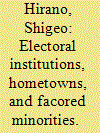

|
|
|
| 8 |
ID:
092500
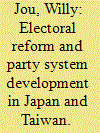

|
|
|
| 9 |
ID:
102713
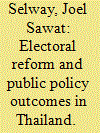

|
|
|
|
|
| Publication |
2011.
|
| Summary/Abstract |
How do changes in electoral rules affect the nature of public policy outcomes? The current evidence supporting institutional theories that answer this question stems almost entirely from quantitative cross-country studies, the data of which contain very little within-unit variation. Indeed, while there are many country-level accounts of how changes in electoral rules affect such phenomena as the number of parties or voter turnout, there are few studies of how electoral reform affects public policy outcomes. This article contributes to this latter endeavor by providing a detailed analysis of electoral reform and the public policy process in Thailand through an examination of the 1997 electoral reforms. Specifically, the author examines four aspects of policy-making: policy formulation, policy platforms, policy content, and policy outcomes. The article finds that candidates in the pre-1997 era campaigned on broad, generic platforms; parties had no independent means of technical policy expertise; the government targeted health resources to narrow geographic areas; and health was underprovided in Thai society. Conversely, candidates in the post-1997 era relied more on a strong, detailed national health policy; parties created mechanisms to formulate health policy independently; the government allocated health resources broadly to the entire nation through the introduction of a universal health care system, and health outcomes improved. The author attributes these changes in the policy process to the 1997 electoral reform, which increased both constituency breadth (the proportion of the population to which politicians were accountable) and majoritarianism.
|
|
|
|
|
|
|
|
|
|
|
|
|
|
|
|
| 10 |
ID:
071588
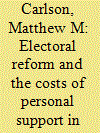

|
|
|
|
|
| Publication |
2006.
|
| Summary/Abstract |
How does the choice of electoral rules affect politicians' incentives to campaign on the basis of personalized support? This article examines to what extent the adoption of new electoral and campaign finance rules affects the incentives of politicians in Japan's Liberal Democratic Party to rely on personal support organizations called koenkai. The core of the analysis utilizes newly collected campaign finance data. The empirical analyses confirm a considerable weakening in the number of koenkai across systems as well as a decreased need for politicians to spend money in the new proportional koenkai representation tier. These results highlight the importance of previous organizational legacies as well as the efforts of political actors to mitigate the effects of rule change on their election and reelection prospects.
|
|
|
|
|
|
|
|
|
|
|
|
|
|
|
|
| 11 |
ID:
161854
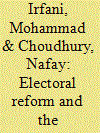

|
|
|
|
|
| Publication |
Kabul, AISS, 2018.
|
| Description |
x, 114p.pbk
|
| Series |
Political System Reform Studies III
|
| Standard Number |
9789936807006
|
|
|
|
|
|
|
|
|
|
|
|
Copies: C:1/I:0,R:0,Q:0
Circulation
| Accession# | Call# | Current Location | Status | Policy | Location |
| 059537 | 324.630581/IRF 059537 | Main | On Shelf | General | |
|
|
|
|
| 12 |
ID:
168519
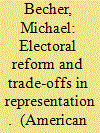

|
|
|
|
|
| Summary/Abstract |
We examine the effect of electoral institutions on two important features of representation that are often studied separately: policy responsiveness and the quality of legislators. Theoretically, we show that while a proportional electoral system is better than a majoritarian one at representing popular preferences in some contexts, this advantage can come at the price of undermining the selection of good politicians. To empirically assess the relevance of this trade-off, we analyze an unusually controlled electoral reform in Switzerland early in the twentieth century. To account for endogeneity, we exploit variation in the intensive margin of the reform, which introduced proportional representation, based on administrative constraints and data on voter preferences. A difference-in-difference analysis finds that higher reform intensity increases the policy congruence between legislators and the electorate and reduces legislative effort. Contemporary evidence from the European Parliament supports this conclusion.
|
|
|
|
|
|
|
|
|
|
|
|
|
|
|
|
| 13 |
ID:
107087
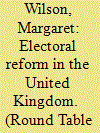

|
|
|
|
|
| Publication |
2011.
|
| Summary/Abstract |
Proposals by the UK Coalition government, which came into power in May 2010, to alter the electoral system for the Westminster Parliament have generated much debate and some controversy. The central plank of the campaigners for reform, viz. the introduction of a form of proportional representation, has been tried in New Zealand for some years now in the form of a mixed member proportional system. This article explains how that system came into being and how it has fared in the nearly two decades for which it has been in existence.
|
|
|
|
|
|
|
|
|
|
|
|
|
|
|
|
| 14 |
ID:
117130
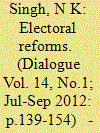

|
|
|
| 15 |
ID:
121836
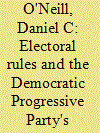

|
|
|
|
|
| Publication |
2013.
|
| Summary/Abstract |
The Democratic Progressive Party (DPP) in Taiwan increased its vote share in each legislative election from 2001 to 2008. Nevertheless, the 2004 and 2008 elections were widely viewed as major defeats for the party. Through an analysis of the DPP's performance in these elections, this article considers the effects of electoral rules on election outcomes and the perception of those outcomes. In Taiwan, under both the previous single non-transferable vote (SNTV) and the current mixed member majoritarian (MMM) systems, the mechanical effect of how electoral rules translate votes into seats and the psychological impact this has on voter and party behavior have influenced party electoral performance, and the perception of it, by causing vote and seat shares to diverge. In addition, this article analyzes whether recent redistricting in Taiwan structurally disadvantages the DPP.
|
|
|
|
|
|
|
|
|
|
|
|
|
|
|
|
| 16 |
ID:
179971
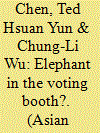

|
|
|
|
|
| Summary/Abstract |
In 2005, the single nontransferable vote system for legislative elections in Taiwan was replaced by a mixed-member majoritarian system, with an accompanying reduction in available district seats. In theory, by increasing the threshold of exclusion and placing the power of nomination in the hands of political parties, this reform should reduce vote-buying and local factionalism. We collected data on legislative nominees charged with vote-buying and on the local factional ties of candidates. Our results suggest that the reforms did reduce these problems. First, comparing the proportion of candidates charged with vote-buying before and after the reform shows a decrease in the second and third post-reform elections. Second, factional status predicts a candidate’s likelihood of running in consecutive elections before the reform but not after. Differences between factional and nonfactional candidates ceased to be significant after the reform, revealing the decreasing relevance of factions.
|
|
|
|
|
|
|
|
|
|
|
|
|
|
|
|
| 17 |
ID:
103540


|
|
|
|
|
| Publication |
2011.
|
| Summary/Abstract |
The scandal over MPs' expenses that erupted in 2009 was followed by a surge in discussion of electoral reform. A range of reforms to Westminster's existing electoral system are now high on the political agenda. This article examines the extent and the nature of the scandal's impact on the electoral reform debate and draws out comparative implications for the sorts of conditions that can force politicians to accept electoral reforms that they do not want. It finds that the expenses scandal significantly changed debate about some electoral reform topics, but not about others. It proposes three factors likely to increase the impact of scandal in sparking reform: that the scandal is seen as harming ordinary people in their daily lives; that reforms can readily be understood as likely to mitigate the sources of scandal; and that those reforms do not seriously harm politicians' own perceived interests.
|
|
|
|
|
|
|
|
|
|
|
|
|
|
|
|
| 18 |
ID:
126892
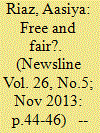

|
|
|
| 19 |
ID:
114785
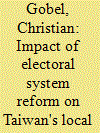

|
|
|
|
|
| Publication |
2012.
|
| Summary/Abstract |
This article discusses specific impacts of the abolishment of the single non-transferable vote (SNTV) in Taiwan. The SNTV had long been seen as a major factor in the sustenance of county- and township-level clientelist networks. It was associated with extremism, candidate-centered politics, vote-buying, clientelism and organized crime involvement in politics. This article examines the impact of the electoral reform on the mobilization capacity of a local faction in a rural county notorious for its factionalism. The analysis indicates that the clientelist structures are too resilient to be affected by even a radical electoral reform.
|
|
|
|
|
|
|
|
|
|
|
|
|
|
|
|
| 20 |
ID:
154386
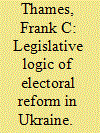

|
|
|
|
|
| Summary/Abstract |
Since the end of Communist rule, Ukraine has undertaken three major electoral reforms, moving from a single-member district majoritarian system, to a mixed-member system, to a closed-list proportional representation system, and back to the mixed-member system. Some argue that political parties are primarily motivated by the desire to maximise seats or improve their ability to impact on policy. I argue that existing theories of electoral reform often assume that parties are unitary actors during electoral reform. My analysis of electoral reform in Ukraine clearly demonstrates significant intra-party dissonance on electoral system preferences. This result questions the usefulness of the party unity assumption.
|
|
|
|
|
|
|
|
|
|
|
|
|
|
|
|
|
|
|
|
|